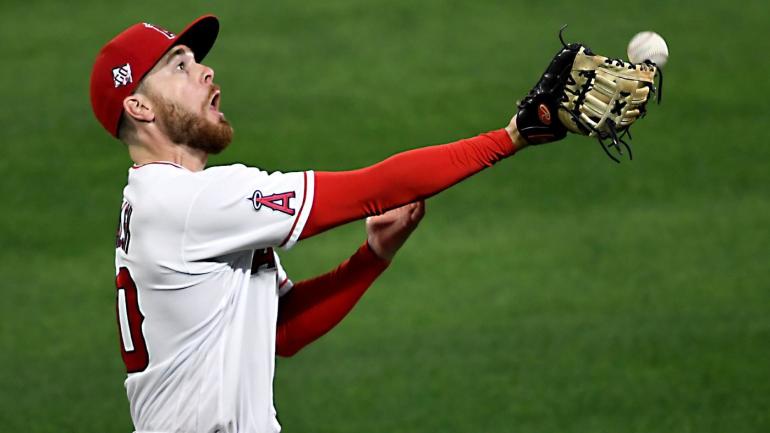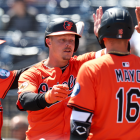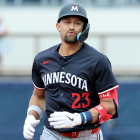
The Los Angeles Angels are back in a familiar place, stationed in last in the American League West with a 14-17 record. The Angels snapped a five-game losing streak against the Los Angeles Dodgers on Friday, but a 7-12 skid since they last held a share of first has reduced their postseason chances to 4.3 percent, according to SportsLine's forecast.
It's become cliché to state that this year was supposed to be different for the Angels; most seasons since 2014, their most recent playoff appearance, were supposed to play out better than they did. What separated this offseason from the ones prior was the hiring of new general manager Perry Minasian, who spent the winter tweaking his pitching staff by adding low-cost veterans. Whatever one thinks of Minasian's work on paper, and the Angels were a trendy preseason pick to reach October, on the field it has resulted in the third-worst run differential in the majors, ahead of only the lowly Pittsburgh Pirates and the ghastly Detroit Tigers.
What, precisely, has led the Angels to these dire straits? And is there any reason to believe they can pull out of their funk? Let's examine three factors.
1. Underperforming pitching staff
The issue: A constant throughout the Angels' playoff drought has been the organization's inability to find quality pitching. It's neither novel or inspiring, then, that the Angels entered Saturday ranked 28th in rotation ERA and 25th in bullpen ERA. On an individual basis, the Angels have had 14 pitchers top the 10-inning mark, and more of them have ERA+ under 80 (four) than have ERA+ above 110 (two). That is, as the saying goes, not what you want.
The verdict: The Angels deserve better results than what they've received. The threesome of Dylan Bundy, Andrew Heaney, and Alex Cobb have a cumulative 4.40 ERA in 88 innings despite combined per-nine rates of eight hits, three walks, one home run, and 12 strikeouts. Their rotation-wide exit velocity, for those suspecting it as the culprit, is the fifth best in the majors.
As for the other half of Los Angeles' rotation, José Quintana has authored enough public meltdowns to qualify for a Substack. Meanwhile, Shohei Ohtani (control) and Griffin Canning (inconsistency) have had issues of their own (though Ohtani's ERA and two-way efforts are likely to earn him leniency). On the whole, though, this Angels rotation should be doing better than it has done. To some extent, a similar argument can be constructed for the Angels bullpen. They have the sixth-best exit velocity and a middle-of-the-pack strikeout-minus-walk rate.
If there is reason to be skeptical about the Angels getting better production from their pitchers heading forward, it's that staff-wide woes can be evidence of larger, systemic issues. Like, say ….
2. Poor defense
The issue: Despite those exit velocity numbers, the Angels have allowed a batting average on balls in play of .317, the second-highest mark in the majors. Predictably, the Angels have the game's worst Defensive Runs Saved total, at minus-26. Only three teams finished with a worse DRS total last season, and that was in nearly twice as many games.
The verdict: It's hard to get worse, right? The Angels will have a better infield defense moving forward, presuming: 1) Anthony Rendon will be at the hot corner for more than half their games moving forward; 2) sure-handed shortstop José Iglesias will not make a season's worth of errors in his next 30 games; and 3) Jared Walsh will give the Angels more mobility than Albert Pujols did at the cold corner.
Even so, the Angels defense could remain subpar because of their outfield (Justin Upton, Mike Trout, and Taylor Ward figure to be negatives) and a catching situation that is seeing them rely on Kurt Suzuki while Max Stassi recovers from a concussion. "Better" doesn't always equal "good," but the Angels pitching staff will take any defensive gains they can get.
3. Unbalanced lineup
The issue: The Angels have one of the best offenses in the majors based on FanGraphs' catch-all wRC+ metric, but they're middle of the pack in runs scored in part because of an uneven lineup. The Angels have given at least 50 plate appearances to 10 players this season: five have OPS+ of 81 or worse, and five have OPS+ of 108 or better. Put another way: it's difficult to avoid trotting out a top-heavy lineup on any given night.
The verdict: It's reasonable to expect second baseman David Fletcher will rebound. Iglesias and Suzuki might, too (though Suzuki's age makes him an attrition risk). But regression can cut both ways, and the Angels probably can't expect Trout, Walsh, and Ohtani to keep this up. The good news is that, in theory, having the same overall production spread out across the entire lineup should result in more runs scored.
Based on the above, it seems fair to think the Angels will play better heading forward -- and that's without considering the possibility of them improving their talent level, either through internal promotions or outside acquisitions. That doesn't mean the Angels will be good enough to make the playoffs, but it should give some hope to a fan base sick of underperformance.
![[object Object] Logo](https://sportshub.cbsistatic.com/i/2020/04/22/e9ceb731-8b3f-4c60-98fe-090ab66a2997/screen-shot-2020-04-22-at-11-04-56-am.png)



















